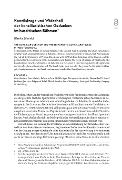Konzilsfrage und Widerhall der konziliaristischen Gedanken im hussitischen Böhmen
( The Conciliar Question and the Response to Conciliarist Ideas in Hussite Bohemia )

Publication date
2022Published in
Historie - Otázky - ProblémyVolume / Issue
14 (1)ISBN / ISSN
ISSN: 1804-1132Metadata
Show full item recordCollections
Abstract
Konciliarismus je teorie nadřazenosti koncilu nad papežstvím. Studie pátrá, zda byly takové myšlenky v Čechách známy. Sleduje prostředí dvora Václava IV., roli pražské univerzity, husitství s jeho viklefskou definicí církve, dobu po uzavření kompaktát a za vlády Jiřího z Poděbrad. Znalost konciliaristických teorií v Čechách je faktem, i když nedošlo na české půdě k jejich rozvíjení a uplatnění. České země nebyly úrodnou půdou konciliaristických myšlenek, přesto v určitých momentech české prostředí sáhlo po konciliaristických argumentech.
Conciliarism is the theory of the supremacy of the Council over the papacy. The study investigates whether such ideas were known in Bohemia. It traces the environment of the court of Wenceslas IV, the role of the University of Prague, Hussitism with its Wycliffian definition of the Church, and the period after the conclusion of the Compactata and during the reign of George of Poděbrady. The knowledge of conciliarist theories in Bohemia is a fact, even if their development and application did not take place on Bohemian soil. The Czech lands were not a fertile ground for Conciliarist ideas, yet at certain moments the Czech environment reached for Conciliarist arguments.
Keywords
Konciliarismus, české země, pozdní středověk, Tetragonus Aristotelis, Václav IV., Jan z Jenštejna, Jan Hus, Štěpán z Pálče, Mařík Rvačka, Jan z Rokycan, Jiří z Poděbrad, Řehoř z Heimburka
Conciliarism, Czech lands, Bohemia, late Middle Ages, Tetragonus Aristotelis, Wenceslas IV, Jan of Jenštejn, Jan Hus, Štěpán of Páleč, Mařík Rvačka, Jan of Rokycany, George of Poděbrad, Gregory of Heimburg
Permanent link
https://hdl.handle.net/20.500.14178/1843License
Full text of this result is licensed under: Creative Commons Uveďte původ-Neužívejte dílo komerčně-Nezpracovávejte 2.0 Generic


